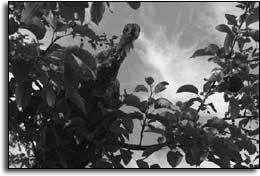
A very merry un-Thanksgiving
by Chef Boy Ari

Many Americans are in love with the idea that our Thanksgiving holiday celebrates a beautiful time of peace, sharing and harmony between the pilgrims and the Indians. The reality of this myth has been challenged on many fronts in the years since the first Thanksgiving was celebrated in 1621 by European immigrants, grateful to have survived the winter, and the Wampanoag Indians who, for better or worse, helped them survive. Although the details are hazy, most reports indicate that this friendship was guarded, often insincere, and that the peace was soon abused. But for at least three days in New England's history, trust and peace might have reigned.
Two years later, a Pilgrim named Mather the Elder gave a Thanksgiving sermon at Plymouth in which he offered extra thanks to God for smallpox, which had wiped out the majority of the Wampanoag, "chiefly young men and children, the very seeds of increase," Mather noted, "thus clearing the forests to make way for a better growth" - i.e. pilgrims.
The pilgrims were not simply the brave religious refugees that history has painted them as. They were the colonizing arm of puritanism, which had ambitious plans to replace the existing world order with one that was more, well, pure. In England, puritans worked to overthrow the government, succeeding in 1649 under Oliver Cromwell. The pilgrims, meanwhile, believed in the imminence of Armageddon and strove to establish a "Kingdom of God," as foretold in the Book of Revelation, in the New World.
The Pilgrims courted the Indians for the first few years, when they most needed the help and were vastly outnumbered. Once more ships came, the Indians became obstacles to progress, and things began to change quickly. A generation later, the Indian and white children of the first Thanksgiving were killing each other in King Philip's War, which by today's standards would be considered genocide upon the Indians. And now, nearly 400 years later, many American Indians consider the American Thanksgiving to be a day of mourning, and more than a few question the wisdom of a Pawtuxet slave named Squanto and the Wampanoags for helping the pilgrims survive that first winter. In 1863, Abraham Lincoln declared Thanksgiving a national holiday, to be celebrated on the fourth Thursday of November. In his Thanksgiving proclamation, Lincoln expressed thanks that the Civil War was nearing its end and that the nation remained united. Lincoln wasn't the only U.S. president associated with the history of Thanksgiving. Years earlier in 1789, George Washington had declared a Thanksgiving celebration to commemorate the new U.S. government. In 1939, Franklin Roosevelt, shrewdly recognizing the modern role of Thanksgiving as the gateway to shopping season, moved Thanksgiving to the third Thursday of November to encourage more Christmas shopping. Congress reversed this move in 1941, but not before Roosevelt's failed stunt was dubbed Franksgiving. A more recent stunt was George Bush's courageous Thanksgiving cameo in Iraq, where he stayed long enough to gather photographic evidence that he was actually there before flying away to safety.
But long before Thanksgiving became intertwined with American history and mythology, all around the world and throughout history, autumn has been the season for celebrations of the harvest and expressions of gratitude for having secured enough food to survive the coming winter. The Aztecs celebrated the corn harvest by beheading a virgin dressed up as the corn goddess. In Europe, one of the oldest celebrations was the Pagan holiday of Mabon, a festival that fell near the end of the grain harvest. This was also a celebration of apples and grapes and the fermented libations of these fruits of autumn. And it was the mating season for deer, also known as hunting season. When the Pagans were absorbed by Christianity, Mabon was superseded by St. Michael and the fall harvest feast became the Christian feast of Michaelmas.
What all of these myths, holidays and proclamations have in common is gratitude, thus the name Thanksgiving. The many annual traditions of autumn harvest celebration reinforce the important connection by which humans cling to the earth and the importance of timing our survival strategies to the seasons.
It's sad that this beautiful ritual has become bound to an inaccurate portrayal of history, and that Thanksgiving has also become known as the day before the biggest shopping day of the year.
That's why I'm making a break from the false myths and consumeristic associations of Thanksgiving and getting back to the roots of the tradition by celebrating what's most important about Thanksgiving: food and gratitude. I think we need a new holiday, a very merry un-Thanksgiving, in which we gather with friends and feast. And I think we should celebrate this very merry un-Thanksgiving on the Monday before mainstream Thanksgiving. Yeah. Thanksgiving Monday. This way, we won't need to split our extra-long weekend for the sake of commemorating a distortion of history and can instead go where we really want to go on our days off, be it skiing, or hunting, or even our aunt's house in Minnesota.
|